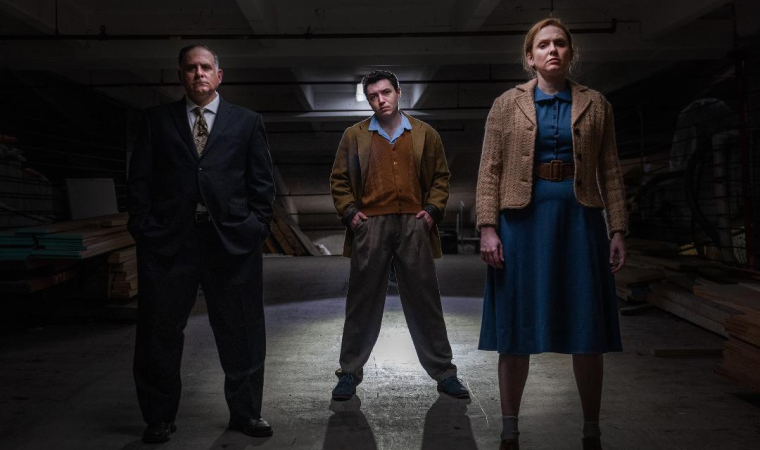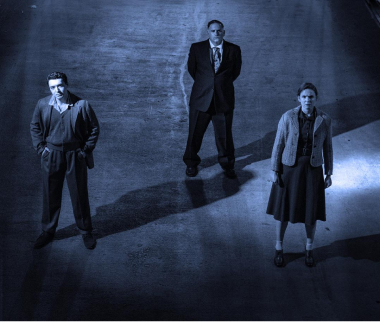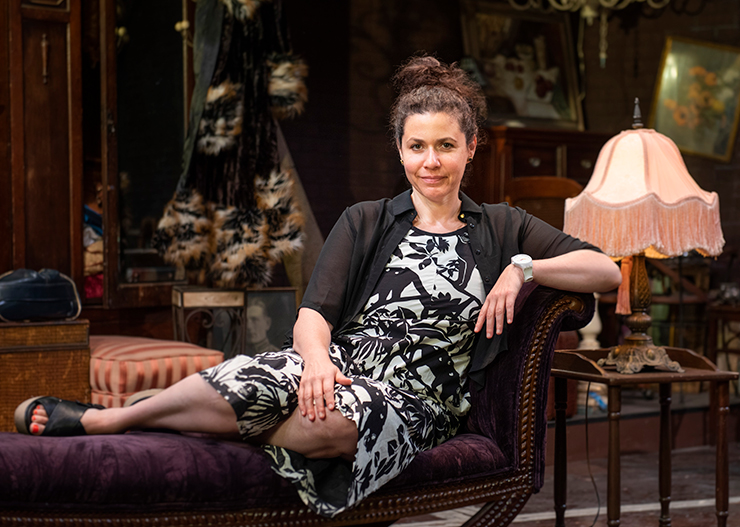
How much would you risk to speak out or take action against injustice and inhumanity? Would you risk losing your possessions, your freedom…or even your life?
You may seriously ponder such questions after experiencing GableStage’s upcoming production of “We Will Not Be Silent.” It is a historical drama by David Meyers. Specifically, the play tells a true story about youthful resistance to the Nazi Regime during World War II.
GableStage in Coral Gables will present the play from Saturday, Jan. 7 through Sunday, Jan. 29. A preview performance is set for Friday, Jan. 6.
[RELATED: See events organized around the play.]
Bari Newport, GableStage’s Producing Artistic Director, helms the production. It will star Meredith Casey as Sophie Scholl, Bobby Eddy as Hans Scholl, and Jason Peck as Kurt Grunwald.
Sophie Scholl was a key member of the “White Rose,” a resistance group run by students at the University of Munich. They distributed leaflets and used graffiti to decry Nazi crimes and the political system while calling for resistance to the Nazi state and the war.
“How could these young people make this incredible bold choice and how did so many others make the opposite choice?" Meyers asked rhetorically as one of the questions at the heart of his play. In it, “Scholl’s moral strength is tested while being interrogated for her crimes, leading her to question whether to save her own life or continue her righteous crusade,” reads a description of the play. " 'We Will Not Be Silent’ is a provocative and timely new work that examines the role of ordinary people in extraordinary times.”

The cast of "We Will Not Be Silent" at GableStage. (Photo by Magnus Stark)
University of Munich students founded The White Rose in 1942. And Meyers noted that we are approaching the 80th anniversary of the events that his play depicts.
Meyers read about The White Rose group in a newspaper while visiting his parents. The playwright’s family mostly survived that time period. For instance, his grandparents escaped Germany in 1939 before Germany sealed off its borders. To this day, Meyers has his grandfather’s passport, which the Nazis stamped with a swastika. Meyers named a fictional character in “We Will Not Be Silent” after his grandfather’s grandfather. The Nazis killed Meyers’ relative at the Terezin concentration camp located 30 miles north of Prague in the Czech Republic.
Given his family’s history, Meyers said he thought he knew so much about that time. How was it possible that he had never heard about the White Rose movement?
And, so, Meyers got to work. For example, he read articles about The White Rose, as well as siblings Hans and Sofie’s diaries. In addition, Meyers read books about what it was like to grow up during Nazi rule.
Meyers wrote “We Will Not Be Silent” in 2015. Then, various theater companies presented readings and workshops of the piece in 2015, 2016, and 2017.
“I feel so lucky to be a tiny part of this story,” he said. “It’s an honor and privilege to preserve the memory of this (tale) and share the story.”
“We Will Not Be Silent’s” professional debut came in 2017. Since its world premiere, there have been three more productions. They include one in 2019 by Theatre Lab, the professional resident company of Florida Atlantic University in Boca Raton. That production included student talkbacks.
It was “really rewarding to see them come and engage in the story,” Meyers said. Regarding Theatre Lab’s production, the writer said, “I think they did a fantastic job.”
Meyers said a common thread that runs through his work is culpability and “why do people make the choices that they do.” The playwright, who grounds his works in realism, said he writes about moral questions and hopes he creates “interesting characters.”
In fact, Meyers said that critics and audiences have compared Sophie Scholl to John Proctor, a landowner accused of witchcraft in Arthur Miller’s masterpiece, “The Crucible.”
“I love ‘The Crucible’ so I’ll always take that as a compliment,” Meyers said.
That work is a 1953 play dramatizing and partially fictionalizing the story of the Salem witchcraft trials. They took place in the Massachusetts Bay Colony during the 1600s. Authorities reportedly accused more than 200 people of practicing witchcraft, and executed 20.
Miller wrote “The Crucible” as an allegory for McCarthyism, when, during the 1950s, the United States government persecuted people accused of being communists.

David Meyers, playwright.
Meyers said that Sophie Scholl was like a “female John Proctor” in that her integrity and values guided her. Further, she refused to take the “easy choice” by remaining silent about what she felt was wrong.
The playwright said “We Will Not Be Silent” is timely in that people all over the world are speaking out against injustices.
Newport agreed, saying that Meyers’ play is inspiring and all too relevant today.
“Unfortunately, there’s nothing in this play that is so far off from what society, and specifically, American society is continuing to grapple with,” she said. “These are very human questions of how and when to draw the line on one’s own moral fortitude when everyone and everything around you (are) lacking that strength. When it really comes down to having conviction, few of us (are) brave enough to put our life on the line.”
There is “no better time than now to remind ourselves that we cannot be silent and that we as individuals are not powerless but have all the power, and that power is our voice,” Newport said.
Meyers introduced Newport to “We Will Not Be Silent” through mutual friends. Meyers said that up until now, men directed productions of his play, although female directors helmed a lot of the play’s readings. However, Meyers wanted a woman to direct a production of the play.
“It really is about this amazing female protagonist,” the playwright said. He added he figured that perhaps a woman would see things in the play that a man would not.

Producing artistic director Bari Newport (Photo by Magnus Stark)
Newport, who referred to the play as a “psychological thriller,” read the piece. And the next day, she sent Meyers an e-mail. It informed him that she would direct GableStage’s production. She had not heard about The White Rose before reading the play.
“I think that he has chosen a very dramatic and inspiring story (to write about),” Newport said. She added that Meyers “has a compelling way of weaving complex arguments into character studies.”
Meyers said he enjoys reading and writing about history. In fact, his favorite thing to write about are historical subjects. The past “definitely informs the future,” he said. “I think there’s some comfort in knowing that people have been through really trying times before and they’re still here.”
In addition to history, Meyers, as you might expect, loves live theater. It is “the most exciting medium.” There is “nothing quite like seeing a play in a room full of people and sharing that energy.”
The 38-year-old, with dark, wavy hair, dark eyes, a pleasant voice, and an easy smile, fell in love with the art form at age 6 when he saw “Peter Pan” on Broadway. He loved the production and reportedly refused to leave until he could see the show again. However, a “disgruntled usher” forced him to leave.
Meyers, an actor as well as a playwright, has been working in live theater for about the past decade. In addition, he worked in the White House and the Senate. Not surprisingly, the subjects he covers in his plays include politics. Actually, Meyers said at one point, he thought he might re-enter politics. But for now, he is concentrating on his work in live theater. In fact, he said his future hopes for “We Will Not Be Silent” include a New York production.
Several people have told Meyers that they read the play in one sitting and did not put it down.
He hopes audiences watching the play at GableStage have the same reaction.
GableStage’s production of “We Will Not Be Silent” officially opens on Saturday, Jan. 7 and will run through Sunday, Jan. 29. Show times are 8 p.m. Thursday through Saturday, 2 p.m. and 7 p.m. Wednesdays, as well as 2 p.m. and 7 p.m. on Sunday, Jan. 8. Ticket prices range from $35-$65. For tickets, and more information, go to www.gablestage.org, or call (305) 445-1119. GableStage is located at 1200 Anastasia Ave. in Coral Gables, next to the Biltmore Hotel.




